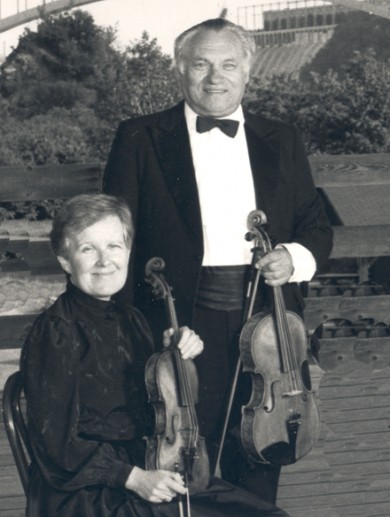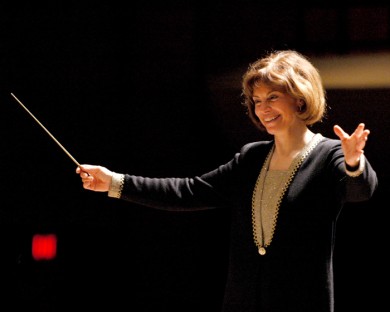Growing up with the Buffalo Philharmonic

The author's parents, Clementina and Bernard Fleshler, were longtime members of the Buffalo Philharmonic Orchestra.
As children, my brother, sister and I haunted the shadowy backstage tunnels of Kleinhans Musical Hall, the Buffalo Philharmonic Orchestra’s modernist home at the edge of the city’s bohemian Allentown district. In the hour or so before a Sunday matinee concert, we would go into a backstage room with a TV set, crowded with musicians watching the Bills play and—this was the late 1970s—usually lose.
The Buffalo Philharmonic, which performs Friday in Fort Lauderdale, was the orchestra I grew up with. My parents, Bernard and Clementina Fleshler, had played in the orchestra since 1959, my father in the viola section, my mother in the first violins. I was proud to have parents who didn’t have normal jobs, whose work took them on occasion to Carnegie Hall, who would come home from a concert and, still in evening clothes, take us out for pizza on Hertel Avenue.
In gray Buffalo, where downtown darkened at 5 p.m., trees grew out of abandoned factory buildings and the sky tended toward a polar white, the orchestra was a splash of color and sophistication. It was a place of European accents, conservatory graduates, musicians with links to the giants of the past. At a rehearsal of the tone poem Don Juan, an old Italian violinist with an elegant goatee leaned toward my mother and said, “I played this with Richard Strauss, you know.” A trumpet player, probably the last communist in western New York State, when asked to demonstrate his instrument to some schoolchildren, serenaded the tots with a few bars of the Internationale.
Like the other first-class cultural institutions that remain in gritty, blue-collar cities, the orchestra grew out of the industrial prosperity of the first half of the 20th century. Autocratic conductors from Europe, such as William Steinberg and Josef Krips, led the Buffalo Philharmonic in the 1940s and 50s, recruiting musicians from Germany, Austria, Hungary and other countries and establishing the orchestra’s tone of European warmth.
This gemütlich era ended abruptly with the arrival of the Berlin-born conductor and composer Lukas Foss, who moved to make the BPO a leader in contemporary music. Although many audience members tried to keep up, a large number couldn’t stand the new programming. According to Ed Yadzinski, the orchestra’s historian and former clarinetist, Foss’s tenure had the effect of enriching the concert hall’s downstairs bar, where patrons would sit over a Scotch until the baffling noise by John Cage or Iannis Xenakis had ceased and they could return to the auditorium and hear some Schubert.
My own musical memories of the orchestra began with Michael Tilson Thomas, the whiz-kid who led the orchestra while still in his 20s, from whom I first heard the symphonies of Mozart, Beethoven, Mahler and Dvorak. Much of this was noise to me at first. My “aha” moment—when I realized classical music wasn’t just a mass of gray sound imbibed by the elderly—came when Ruggiero Ricci arrived to play the Brahms Violin Concerto. I sat there in Kleinhans Music Hall in wonder as Ricci spun a fantastic embroidery of sound with his Guarnerius, enveloped in the rich tones of the orchestra. (And since then, I couldn’t quite forgive any violin concerto that didn’t have as dramatic a solo opening as the Brahms).
I called up my parents, now retired and living in Los Angeles, and asked about their most memorable moments with the orchestra. My mother mentioned a time guest conductor Sir Neville Mariner led the orchestra in Elgar’s Enigma Variations, particularly the famous “Nimrod.” “He brought that to such a climax,” my mother said, “you got goose bumps.”
And both my parents fondly recall the orchestra’s 1988 European tour, which brought them to the stage of Vienna’s legendary Musikverein. They played the Shostakovich Fifth Symphony and Beethoven’s Emperor Concerto with pianist Radu Lupu in the ornate hall where Brahms and Hans Richter had conducted, a venue that had seen the premieres of Brahms’ Second and Third symphonies, the Tchaikovsky Violin Concerto and the Bruckner Eighth Symphony.
The orchestra has seen a parade of world-famous soloists. When Jascha Heifetz came to rehearse the Beethoven Violin Concerto, Krips drove him crazy. Krips led the orchestra through the long opening tutti, then, as Heifetz placed his violin under his chin to play the solo opening, Krips stopped him. Not yet, he said, I want to go through the tutti again. He led the orchestra through the opening, and Heifetz raised his violin to play his broken octaves, and Krips stopped him again. After the third time, Heifetz walked off the stage. “Well,” Krips said, “we can get another fiddle player.”
The pension fund benefit concert always brought in a big name, whose high fee was compensated for by a sold-out house at premium prices. Of these, the most impressive may have been Plácido Domingo, who sang Che gelida manina, Recondita armonia and the tomb scene from Lucia di Lammermoor and then quietly, without seeking attention or credit, waived his fee.
The Buffalo Philharmonic has a long tradition of performing at Carnegie Hall, a point that impressed even my Space Invaders-playing friends. In the late 1980s, when my sister and I were living in New York, they came to Carnegie to play the Saint-Saens Cello Concerto No. 1 with Lynn Harrell and the Shostakovich Fifth. They sounded fantastic. The Shostakovich Largo was grave and moving, and I remember how the soft passages filled the hall. The climactic ending of the last movement – which I didn’t know then had an ambiguous side – was an exciting ride.
We couldn’t wait to see what the critics thought. I bought the New York Times the next day. Nothing. Maybe no one was there. I bought the paper Tuesday at a Brooklyn news stand and opened it up on the street. There was the review. “Once in a very long time,” began Tim Page, “the critic is privileged to attend a musical event tinged with greatness.” It was a wonderful review, and Page wrote, “There is a strength to the Buffalo Philharmonic’s playing, a muscularity that seems to be endemic to cold cities; elegance is forsworn in favor of a warm bear hug.”
Winning a seat in a professional symphony orchestra remains extremely difficult, comparable to winning a spot in the NFL. For a recent second trombone opening in Buffalo, 118 applicants showed up for auditions.

JoAnn Falletta, who will conduct Friday night, has served longer than any previous Buffalo Philharmonic music director.
Like most of its counterparts in older industrial cities, the Buffalo Philharmonic has struggled over the past 30 years. But under its enthusiastic and ambitious music director JoAnn Falletta, now the orchestra’s longest-serving conductor, the orchestra returned to Carnegie Hall in 2004, after a 16-year absence.
The Philharmonic has made several recording for Naxos. And last year the orchestra won two Grammy awards, in the categories of Best Classical Performance and Best Classical Composition for its John Corigliano: Mr. Tambourine Man: Seven Poems of Bob Dylan; Three Hallucinations.
At the concert this Friday at Fort Lauderdale’s Parker Playhouse, the orchestra will perform the Tchaikovsky Violin Concerto, with concertmaster Michael Ludwig as soloist. It will also perform Rachmaninoff’s Symphony No. 2, a dramatic and richly scored work whose lavish melodies have for years been appropriated for pop songs.
Falletta said the work suits the orchestra’s tone and style. “The orchestra has a very warm, European sound, and maybe that goes back to the days of Krips and Steinberg,” Falletta said. “And the Rachmaninoff really uses that deeply romantic, European sound.”
When Falletta raises her baton at the Parker Playhouse, I’ll be in the audience, along with my wife Amy, stepson Henry, and Amy’s parents, John and Sylvia Shaw. But I had to turn down the chance to review the orchestra. I’m probably a little biased.
The Buffalo Philharmonic performs 8 p.m. Friday, March 12 at Fort Lauderdale’s Parker Playhouse. Call 954-462-0222 or go to www.browardcenter.org.
Posted in Uncategorized
8 Responses to “Growing up with the Buffalo Philharmonic”
Leave a Comment
Wed Mar 10, 2010
at 4:36 pm
8 Comments







Posted Mar 11, 2010 at 9:38 am by Raya Lee Then
Your article made me laugh, it made me cry. Wonderful! Thank you.
Posted Mar 11, 2010 at 10:29 am by Benjamin
What a wonderful, well written and interesting piece. Thanks for sharing your memories.
Posted Mar 12, 2010 at 4:00 pm by Paul Ferington
Not only a wonderful article, but a wonderful tribute to your beloved parents! They continue to be special friends in our lives and symbolize the greatness of the BPO.
Posted Mar 13, 2010 at 11:15 pm by Leslie Bahler
Thanks for sharing your personal stories with us. I take pride in showing off our BPO to south Florida.
Posted Apr 08, 2010 at 5:09 pm by Kathy Noye
A friend sent me a printout of this article. It was interesting to read. Give my best regards to your parents, along with my e-mail address.
Posted Sep 22, 2010 at 5:20 pm by Ellen Rosen
David: Your dad taught me violin back in the 1970s. He and your mom are two of the most wonderful people. When my dad was unemployed, your dad gave me lessons for free. He took me to concerts. I remember you and your family well, and fondly.
Posted Apr 21, 2011 at 10:57 am by Alan Heatherington
I, too, grew up with the Buffalo Philharmonic at the feet of Josef Krips. When I returned to Buffalo to head the orchestral conducting and string departments at the university, I played with your parents in the BPO, including the Carnegie Hall concert to which you referred. Your article brought back many fond memories! Thank you for posting it.
Posted May 15, 2014 at 11:01 am by Rita Bustamante
I have been trying to locate the names of the BPO Musicians prior to 1935-1936. That is the latest year I was able to find. My dad had played prior to his marriage to my mom. He was born in 1904 and stopped playing after his marriage at the age of 28. Can you direct me to the proper authority from whom I may be able to locate this information? I would love to share this with my surviving family.
Sincerely,
Rita Manhardt Bustamante